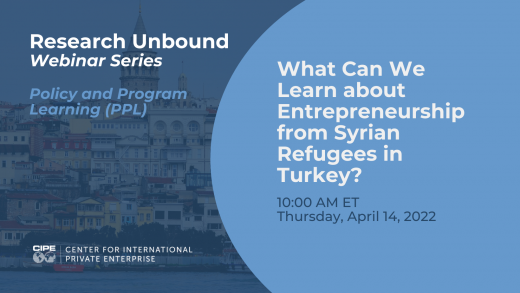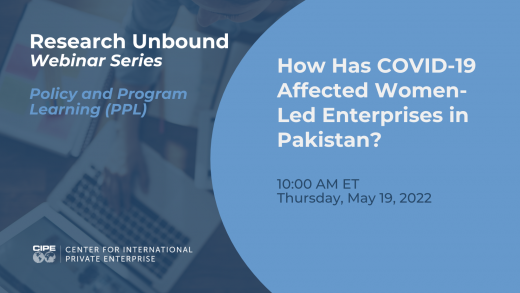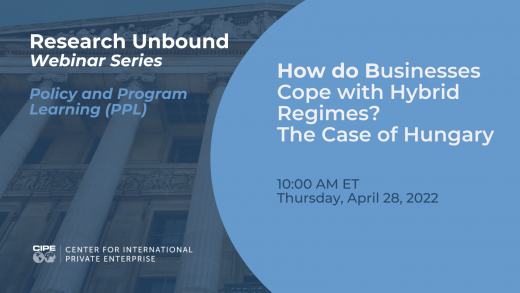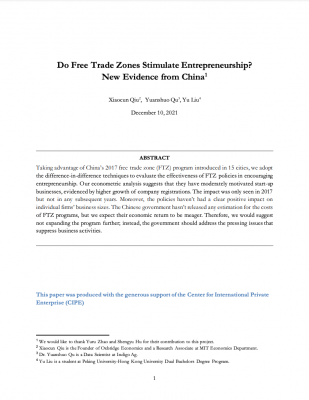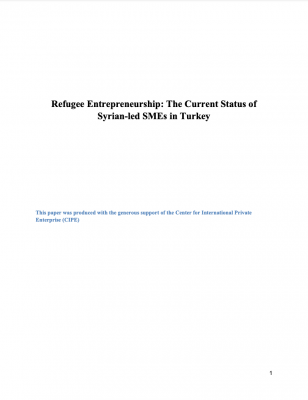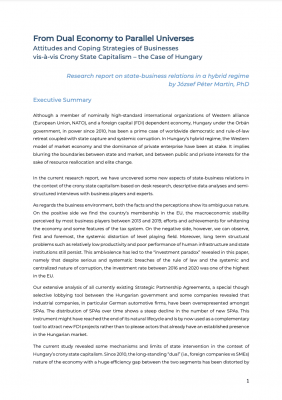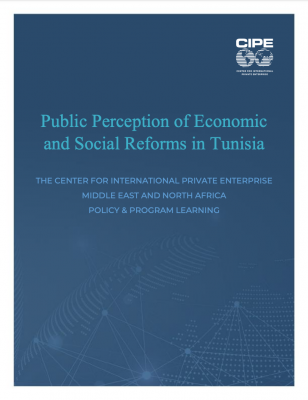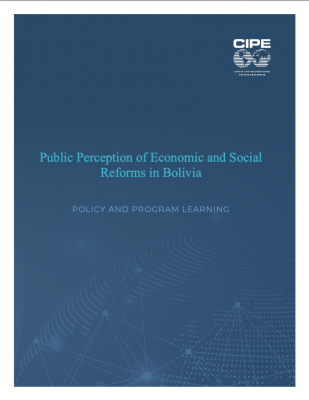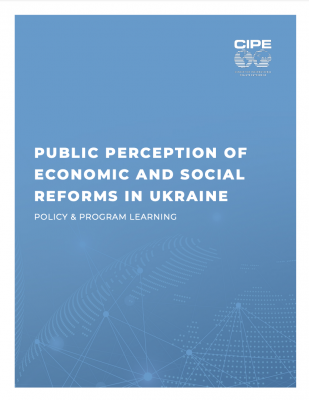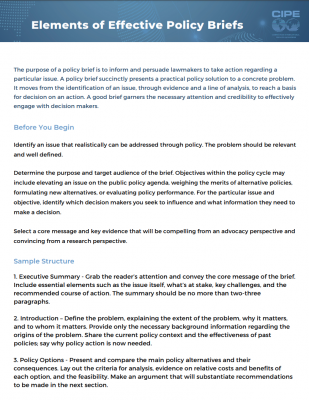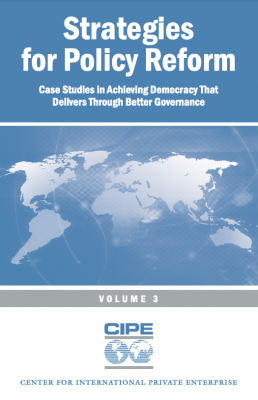In today’s environment, knowledge and learning are essential for organizations that seek to maintain their relevance, compete, and offer unique value to their clients and partners. CIPE stands apart from its peers because of the strong commitment to place learning at the core of its strategy and offer practical solutions to partners. The role of Policy and Applied Research is to revitalize and ceaselessly refresh this well of learning and knowledge. The unit is an integral part of Policy & Program Learning (PPL) that serves as CIPE’s in-house unit for policy analysis and research. The team works closely with CIPE’s leadership to identify knowledge gaps in the organization’s portfolio, and then uses the latest research findings to generate pragmatic answers and solutions.
The unit’s core product consists of a series of issue papers commissioned from international scholars and experts on specific policy and market areas. The Policy and Applied Research team has worked with scholars from around the world, including reputable institutions such as Harvard and Oxford Universities. In 2020-21, the unit commissioned fifteen research papers that focused, among others, on hybrid regime’s threat to markets and democracy (Hungary), free trade zone’s impact on entrepreneurship (China), policy participation among business associations (Kenya), refugee entrepreneurship (Turkey), digital regulatory challenges (Ukraine), deliberative democracy and innovations in South America, and a review of ECG best international practices. Key findings from this research were highlighted in Research Unbound, a webinar series in which scholars presented their research to CIPE audiences and beyond.
Policy Solutions Series
Webinar: Economic Dignity, Democracy, and Populism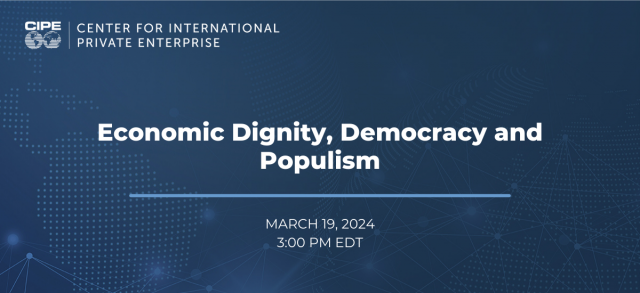
One of democracy’s fundamental advantages over other non-representative forms of government is its inherent link to human dignity. A functioning democratic government requires more than political and economic expediency. Democracy binds governments to a social contract with their citizens, not only to respect their diverse voices, but recognize their political and economic contribution to the society. Breach of this contract may lead to popular backlash against institutions and the government. Join this webinar to learn more about how economic and political dignity has played a role in the political crisis of the last decade.
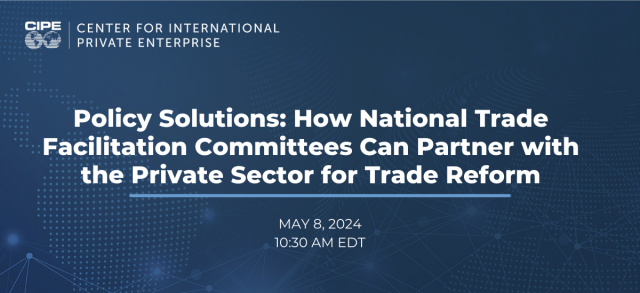
National Trade Facilitation Committees (NTFCs) are platforms conceived to coordinate interagency work in trade reform and facilitation. However, a great number of them lack the appropriate structure or capacity to be successful in fulfilling their long-term goals. The discussion examines effective institutional practices that enable NTFCs to play a vital role in fostering policy dialogue. Webinar attendees will learn how these bodies can support trade expansion and economic growth through public-private partnerships, stakeholder engagement, information exchange, capacity building, and international cooperation.
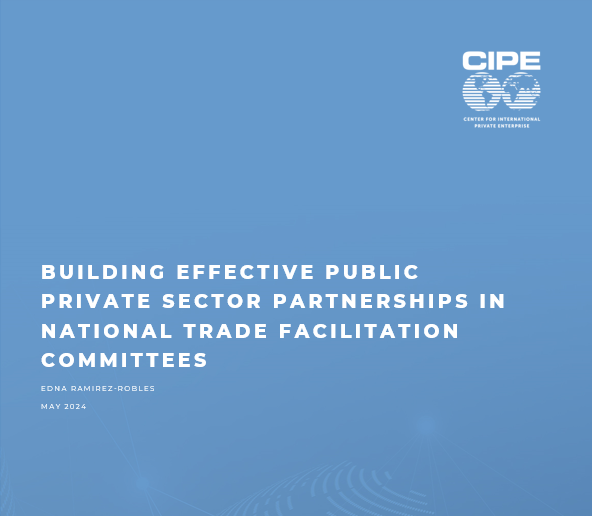
National Trade Facilitation Committees (NTFCs) oversee a country’s policies, initiatives, and reforms on trade, and occasionally in transport. Any standing member of the United Nations can form an NTFC to enforce the rules and regulations set forth by the World Trade Organization’s (WTO) Trade Facilitation Agreement (TFA)—the international agreement on trade law which mandated the formation of NTFCs and to which they all abide.
NTFC members have traditionally been comprised of public sector agencies; case studies have shown that participation from and collaboration with the private sector have become key to the sustainability of NTFCs. This paper examines the benefits of private sector membership in NTFC, and proposes transparent, innovative, and collaborative mechanisms to engage with the public sector.
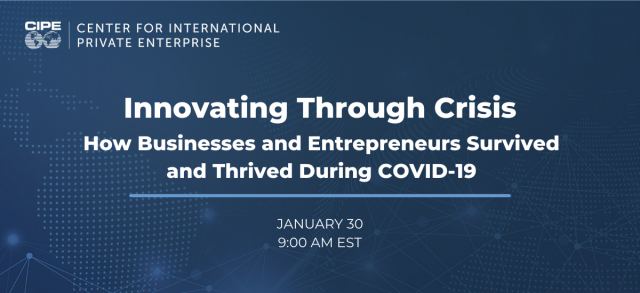
Join us for a discussion on building private sector resilience through crisis, following the release of a new issue paper on the Albanian private sector’s response to COVID-19. Using survey and interview data, Researcher Brunilda Kosta highlights ways that businesses not only survived COVID-19, but also thrived, ranging from digitizing processes to diversifying supply chains and working with local governments for additional support.
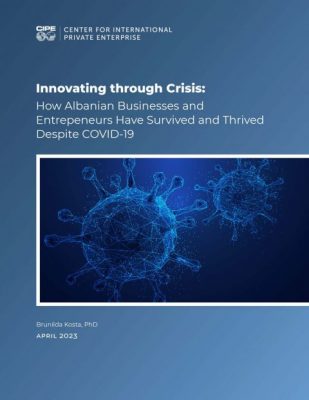
Albania was significantly affected by the COVID-19 pandemic, and businesses had to adapt to the changes brought about by this crisis. Research so far on the Albanian context has focused on entrepreneurs’ challenges and problems due to COVID-19. However, it is also essential to highlight the opportunities created by this pandemic. This CIPE-commissioned study by Dr. Brunilda Kosta investigates Albanian businesses’ strategies and business model changes in response to COVID-19, providing insight into how to navigate through such crises effectively.
Other Applied Research Webinars/Papers
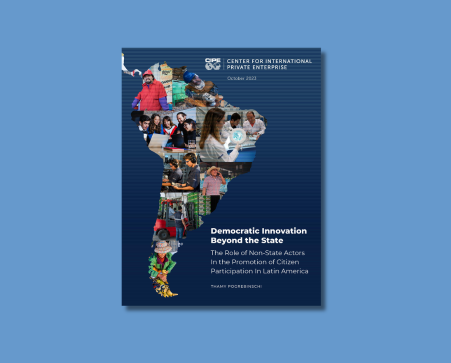 Democratic Innovation Beyond the State
Democratic Innovation Beyond the State
This examines the role of non-state actors in the promotion of democratic innovations through the lens of Latin America.
Research Unbound: Free Trade Zones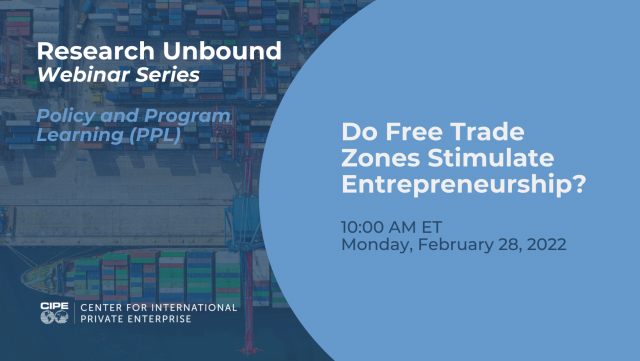
In this webinar organized by Policy & Program Learning (PPL) at CIPE, Tiffany Qiu of Oxbridge Economics will present findings from her paper, ”Do Free Trade Zones Stimulate Entrepreneurship? New Evidence from China.
Research Unbound: Syrian Refugee Entrepreneurship
In this webinar, Dogan Çelik and Nazli Kazanoglu present their report findings on the opportunities and challenges of refugee-led small businesses that are transforming the lives of refugees and contributing to the overall economic growth in Turkey.
Research Unbound: Women Entrepreneurs in Pakistan
This webinar explores the issues faced by women-led enterprises in Pakistan during the COVID-19 pandemic.
Research Unbound: Hybrid Regimes
In this webinar, Jozsef Peter Martin, Ph.D., presented his paper on state-business relations and the nature of the business environment and democracy in Hungary.
Do Free Trade Zones Stimulate Entrepreneurship? New Evidence from China
In a paper produced with support from the Center for International Private Enterprise, the authors look at the effects of China’s 2017 free trade zone (FTZ) program.
Refugee Entrepreneurship: The Current Status of Syrian-led SMEs in Turkey
This research project aims to explore the ways in which refugee entrepreneurship and firms created by the Syrian refugees in Turkey contributes to economic growth within Turkey’s humanitarian aid and sustainable development nexus. The research findings show that the entrepreneurship-focused non-financial intervention repertoire offered to the Syrian SMEs in Turkey includes training and mentoring sessions on different topics, one-on-one coaching meetings together with matchmaking/twinning and networking.
From Dual Economy to Parallel Universes: Attitudes and Coping Strategies of Businesses vis-à-vis Crony State Capitalism – the Case of Hungary
In this research report, we have uncovered some new aspects of state-business relations in the context of the crony state capitalism based on desk research, descriptive data analyses and semi-structured interviews with business players and experts.
HUBS
Public Perception of Economic and Social Reforms in Tunisia
In Tunisia, CIPE is engaging civil society to inject fresh thinking into a repetitive and stagnant public debate over economic reform. CIPE adapted the questionnaire it used in Bolivia and Ukraine to the Tunisian context and hired Elka Consulting, a leading Tunisian research firm, to conduct a survey of 1,009 men and women across urban and rural areas in Tunisia from November 3 to 11, 2021.
Public Perception of Economic and Social Reforms in Bolivia
In Bolivia, CIPE worked with an advocacy business group to help frame reform priorities, based on credible economic arguments, by incorporating the perspectives of civil society. To understand what the public thought about which reforms were needed, CIPE designed a survey and contracted CiesMori, a professional polling firm in Bolivia, to measure the public opinion of men and women between ages 18 and 65 in urban areas in Bolivia.
Public Perception of Economic and Social Reforms in Ukraine
CIPE created the Knowledge Hubs for Democratic and Market Transition project with the financial support of the National Endowment for Democracy (NED) to build a broader consensus around reform priorities in Ukraine, Tunisia, and Bolivia — three countries undergoing democratic transitions that have experienced serious political and economic challenges over the last decade. To help coordinate business and civil society efforts on reform and improve understanding among stakeholders, the initiative has supported surveys in each country on popular perceptions of the economy and economic reform.
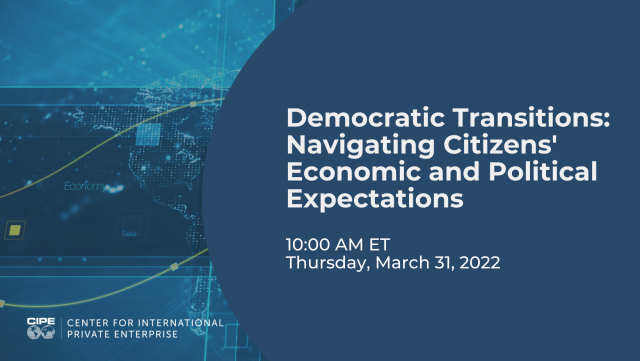
Democratic Transitions: Navigating Citizen’s Economic and Political Expectations
To enable business leaders to effectively frame reform messages around economic and political priorities in Ukraine, Tunisia, and Bolivia, the Center for International Private Enterprise created local market transition hubs (known as the HUBS project). The local hubs coordinate stakeholder outreach to identify politically viable, inclusive economic reforms; frame the case for reform; and embed the knowledge in reform coalitions.
Other Research
Corrosive Capital: Known Unknowns
Since 2015, CIPE has observed authoritarian governments pursuing international investment agendas as a means to exert influence and undermine markets in emerging democracies around the world. These investments pose a systemic threat to democracies and free and inclusive markets. CIPE has coined this investment “Corrosive Capital.”
The Kampala Principles in Action: Case Studies in Private Sector Engagement
The need for better partnerships with the private sector has become an imperative in the quest for sustainable development and shared prosperity. Thanks to new case studies on the Kampala Principles, released this week, we now can visualize the ingredients of effective partnerships.
PPL References and Resources
How to Write a Policy Brief
The purpose of a policy memo is to inform and persuade lawmakers to take action regarding a particular issue. A policy brief succinctly presents a practical policy solution to a concrete problem. It moves from the identification of an issue, through evidence and a line of analysis, to reach a basis for decision on an action. A good brief garners the necessary attention and credibility to effectively engage with decision makers.
Strategies for Policy Reform
Strategies for Policy Reform, Volume 3 contains the most recent and thoroughly detailed real world program experiences to date. Intended as inspiration and guidance for reformers, the cases capture a broad range of learning which may be adapted to new circumstances. This volume covers the implementation of programs across CIPE’s four areas of focus: Enterprise Ecosystems, Business Advocacy, Democratic Governance, and Anti-corruption & Ethics.
Who We Are
Mikra Krasniqi
Program Director, Policy & Program Learning
Tamari Dzotsenidze
Program Officer, Policy & Program Learning

Adam Goldstein
Program Officer, Policy & Program Learning


